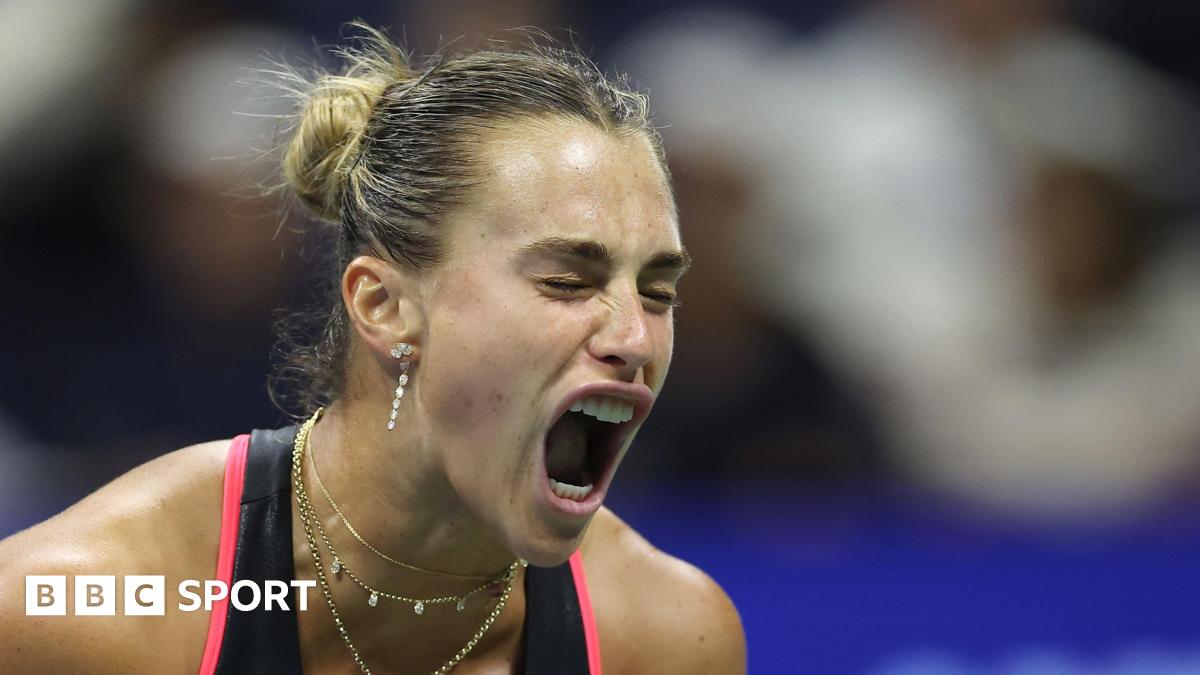Sabalenka has machine-like consistency - but shes no robot
- BBC News
Aryna Sabalenka continues her US Open title defence against Jessica Pegula - a repeat of last years final
US Open 2025 womens semi-finals
Venue: Flushing Meadows, New York Date: 5 September (00:00 BST)
Coverage: Live radio commentary on 5 Live Sports Extra and BBC Sounds, plus live text commentary on the BBC Sport website & app
Aryna Sabalenka has produced a consistency at the Grand Slam tournaments which is unrivalled in the womens game.
With a powerful style translating across court surfaces, the world number one has made 12 semi-final appearances in her past 13 major tournaments - with the latest coming when she faces Jessica Pegula at the US Open on Thursday.
But heres the kicker - Sabalenkas tendency to combust at a critical juncture means only three of those have resulted in titles.
None of the 27-year-old Belarusians runs at this years majors have ended with the trophy.
In the Australian Open final, French Open final and Wimbledon semi-finals, an erratic level has led to devastating defeats.
Sabalenkas last major trophy came when she beat Pegula in the New York final 12 months ago and, in a bid to get over the line again, she has brought 10-time doubles Grand Slam champion Max Mirnyi into her team.
"Everything fluctuates in life," Mirnyi, speaking after Sabalenkas practice at Flushing Meadows on Wednesday, told BBC Sport.
"Were not machines, were not robots, right? As good as some of the professionals are in their fields, they’re still human.
"It comes down to being good, but not always perfect. A tennis match is very tough to make perfect.
"But its OK - shes getting to the latter stages of Slams consistently, which makes us believe she is putting herself in the position time and time again to win it."
When Sabalenka cannot find a way to win - particularly in the biggest moments - she admits it is because she is known to "lose control", mentally and emotionally.
In Melbourne, it was frustration at being unable to cope with Madison Keys destructive power.
At Roland Garros, it was fury at hitting 70 unforced errors as Coco Gauff fought back.
At Wimbledon, it was fear at not matching Amanda Anisimovas bravery.
"I think its good she is emotional. But its about having control over those ups and downs," Mirnyi said.
"As she gets older she gets more experienced, she will advance more and more in that department - its natural when youre younger and more emotional to have more outbursts.
"Here she has been very comfortable [emotionally] and is confidently progressing in all facets of the game."
One area where Sabalenka has remained solidly composed recently is a tie-break situation.
The three-time major champion has won her past 17 tie-breaks, including two in New York to reach the last four without dropping a set.
There could be another factor - mentally and physically - which comes into play when she faces American fourth seed Pegula in Thursdays first semi-final.
Sabalenka has not played since Sunday, after injured quarter-final opponent Marketa Vondrousova withdrew less than two hours before Tuesdays match.
Can a walkover be a blessing and provide a recharge? Or a curse because it ruins rhythm?
"It can be tricky," former Wimbledon champion Marion Bartoli said on Sky Sports.
"Thats why every single person in her team has to play that role of making sure the body is functioning properly and making sure her mind is there."
In a bid to avoid any ring-rust, Sabalenka and her team have been hitting the practice courts hard.
Sabalenka added Mirnyi to complement her long-time coach Anton Dubrov (left) and hitting partner Andrei Vasilevski (second left)
After discovering Vondrousovas misfortune, they spent about an hour practising on Tuesday evening to simulate a match scenario.
"I just wanted to move and throw the energy I had," said Sabalenka.
"I wanted to sweat and pretend it was an activity, or a match or something."
Sabalenka returned to the warm-up courts on Wednesday lunchtime, going through what she would class as a normal session on the days between matches.
An intense 45-minute practice contained a lot of movement and work in different areas of her game - defending, attacking, serve returns - but there was also time for fun.
During serving drills Sabalenka hit spots between the legs of Mirnyi and fitness trainer Jason Stacy.
"As a tennis player youre taught to have to wait around and deal with these conditions," said Mirnyi.
"She knows how to handle these situations, shes been in them before and it shouldnt be an issue."
If Sabalenka loses to Pegula, eighth seed Amanada Anisimova will have the opportunity to set up the first all-American womens US Open singles final since 2017.
But she faces a rejuvenated Naomi Osaka - a two-time champion - in Thursdays second semi-final.
Anisimova was overcome by stage fright when she reached her first Grand Slam final at Wimbledon last month, losing 6-0 6-0 in only 57 minutes against Polands Iga Swiatek.
But the 24-year-old American avenged that chastening experience by beating Swiatek in the New York quarter-finals on Wednesday.
"Its the farthest Ive gone by far at the US Open and its extremely special," said Anisimova, who had previously won only three of her eight matches at Flushing Meadows.
"I have that belief in myself and that confidence that Im able to play at the top level."